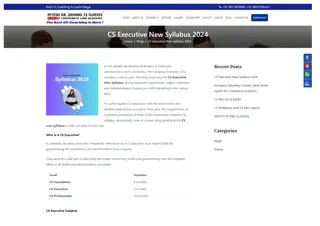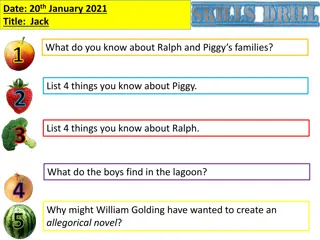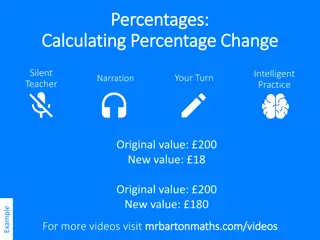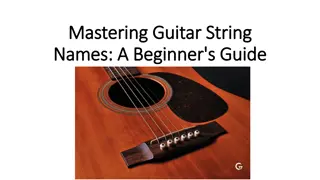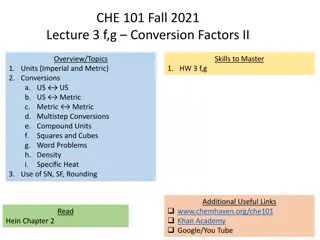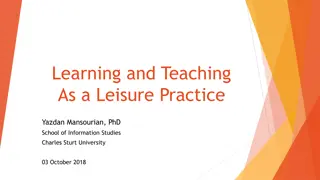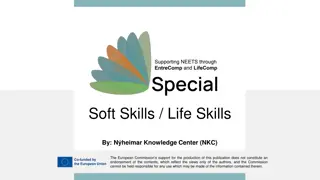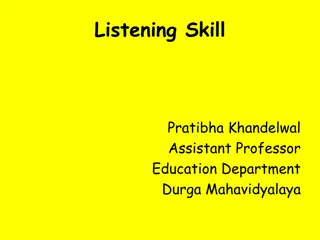Mastering Skills Through Purposeful Practice
Mastering skills, such as perfect pitch in music, requires purposeful and deliberate practice from a young age. The brain's adaptability diminishes after six years old, emphasizing the importance of early training. Effective practice involves setting specific goals, receiving feedback, and pushing beyond comfort zones. Simply practicing more is not as effective as purposeful practice tailored towards improvement. Deliberate practice is the key to success in any domain, focusing on quality over quantity.
Download Presentation

Please find below an Image/Link to download the presentation.
The content on the website is provided AS IS for your information and personal use only. It may not be sold, licensed, or shared on other websites without obtaining consent from the author.If you encounter any issues during the download, it is possible that the publisher has removed the file from their server.
You are allowed to download the files provided on this website for personal or commercial use, subject to the condition that they are used lawfully. All files are the property of their respective owners.
The content on the website is provided AS IS for your information and personal use only. It may not be sold, licensed, or shared on other websites without obtaining consent from the author.
E N D
Presentation Transcript
Peak: Peak: The New Science of Expertise The New Science of Expertise by by Anders Ericsson & Robert Pool (2016) (2016)
Perfect Pitch: Perfect Pitch: Innate Ability or Developed Skill? Innate Ability or Developed Skill? Perfect Pitch is a not a gift of innate ability. The ability to develop Perfect Pitch is the gift. Although perfect pitch is rare, most people can develop it. The catch is that perfect pitch needs to be developed before the age of six. Use it or lose it. Twenty-four children under six were given training for identifying musical chords by sound. Training was four or five short sessions a day, each lasting only a few minutes. Although it took a few children a year and a half, most mastered the task perfectly in less than a year. In fact, everyone had mastered perfect pitch in a year and a half. See (Ayako Sakakibara, 2014) in Psychology of Music.
The Case of Perfect Pitch The Case of Perfect Pitch In the case of perfect pitch, the necessary adaptability in the brain disappears by the time the child passes six years of age. If the rewiring in the brain has not occurred by about six, it likely will never happen. Use it or lose it. The brain is most adaptable in the early years, but even in adulthood, the brain is surprisingly flexible. Those who take advantage of the adaptability of the brain and body are frequently highly successful whether the area is music, art, science, or sport. The earlier the training and practice the better, provided it is the correct training and practice. Neither harder training nor more practice is the key to success; it is the kind of training that counts; the training must be deliberate. Just keep working on it or work harder or longer is not useful advice; deliberate practice is critical.
Practice: Key to Success? Effective practice has the same set of principles, regardless of the domain. Deliberate Practice is the Gold Standard for effective practice. Usual Practice is typical. Get some instruction. Practice the fundamentals until you are satisfied with your performance. Practice more. Play more or do more so the performance becomes automatic. Find your comfort level when you have mastered the basics. Example: Consider writing a descriptive paragraph. Start with a general idea of the task. Get some instruction from a coach, teacher, or book. Practice until you reach an acceptable level. Finally, let it become automatic. There is nothing wrong with this process. But remember, once you reach an acceptable level, your performance levels off, you maintain your level even with repetition; in fact, once you reach your level of acceptability and automaticity sets in, additional years of practice don t lead to growth. Usual practice quickly becomes Na ve Practice--Just do it, just play, just perform-you will get better not really!
Purposeful Practice Purposeful practice is the first step in deliberate practice. Define specific goals. Put together a set of smaller, incremental goals to reach longer-terms goals. Focus on practice gives direction. Provide useful feedback identifies shortcomings. Challenge yourself by pushing beyond your comfort zone--a must to improve. Go beyond trying harder. Trying harder is not enough. Pushing yourself to the limit is not enough if continued growth is the goal. Try differently, not harder. In sum, purposeful practice means get yourself out of your comfort zone, but do it in a focused way, with clear goals, a plan to achieve those goals, a way to monitor your progress, and figure out a way to stay motivated.
Deliberate Practice The principles of deliberate practice provide the best route for effective practice. Deliberate Practice goes beyond Purposeful Practice. Deliberate Practice goes beyond focusing Deliberate Practice goes beyond pushing outside youy comfort zone. Deliberate Practice is not much fun but rather it is hard work. Deliberate Practice is the gold standard or ideal to anyone learning a skill. Fields most susceptible to deliberate practice have following characteristics: They have objective ways to measure performance. They are competitive fields that provide incentives to practice and improve. They are well-established fields. They have a subset of performers who serve as teachers or coaches who have developed sophisticated training procedures to improve skills over time. Expertise requires thousands of hours of deliberate practice; nobody develops extraordinary skill without a tremendous amount of practice.
The Principles of Deliberate Practice Deliberate Practice is differentiated from Purposeful Practice in two ways: 1. 2. Deliberate Practice requires a field that is well developed with objective criteria of success. Deliberate Practice requires a teacher who can provide practice activities that improve performance. Deliberate Practice is purposeful and informed; it is informed and guided by the best performers accomplishments and by an understanding of what these expert performers do to excel. Deliberate Practice is purposeful practice that 1) knows where it is going and 2) how to get there.
The Ten-Thousand-Hour Rule Malcolm Gladwell in his popular book, The Outliers, coined the term the ten-thousand-hour rule to describe the development of expertise based on a study of violin players (Krampe, et. al., 1993). According to this rule, it takes 10,000 hours of practice to become an expert in most fields for example, music, chess, art, mathematics, computer programming, etc. The 10,000-hour rule is catchy, appealing, and easy to remember, but not quite true. Not all the violin students in the study were masters of the violin, many were just good, but not masters. The number 10,000 was the average practice time; half of the students had not completed 10,000 hours. Gladwell did not distinguish between regular practice and deliberate practice; ah, there is the rub. The suggestion that almost anyone who puts in 10,000 hours of practice can become an expert is an open question. It surely is the case that it takes a tremendous amount of effort to become an expert in a field, just how many hours is not known at this time, but we can be sure it takes much deliberate practice over many years. In pretty much every area of human endeavor, people have tremendous capacity to improve performance, provided they train and practice the correct way using deliberate practice.
Characteristics of Deliberate Practice 1. Deliberate Practice develops skills that other people have already figured out how to do and for which effective training techniques have been established. 2. Deliberate Practice takes place outside one s comfort zone and requires constantly trying things that are just beyond the zone; it requires near maximal effort, which is not enjoyable. 3. Deliberate Practice involves well-defined, specific goals and often requires improving some aspect of the target performance. Coaches develop a plan of small goals that add up to the designed larger change. 4. Deliberate Practice is deliberate in that it requires a person s full attention and conscious actions. 5. Deliberate Practice involves feedback and modification efforts due to feedback. Practice usually requires adjustment if it is to be effective. 6. Deliberate Practice both produces and depends on effective mental representation. It improves mental representation by making it more detailed and effective, making it possible to improve even more. Mental representations make it possible to monitor how one is doing in practice and actual performance. 7. Deliberate Practice almost always involves building upon or modifying previously acquired skills. Because effective training builds on existing skills, correct fundamental skills are imperative.
Summary of Types of Practice 1. Usual Practice get some instruction, practice instruction keep repeating until performance is automatic. 2. Na ve Practice Belief that this usual practice of repetition leads to improvement. 3. Purposeful Practice push yourself out of your comfort zone with focused, clear, specific goals that are integrated into a long-term plan for success. In the process, get feedback on your performance, which identifies shortcomings that need work and practice. Then push yourself to improve first on small short-term goals and then eventually on the long-term plan Try, Fail, Determine cause, Fix, and repeat the process until successful. 4. Deliberate Practice purposeful practice that is informed and guided by best practices of expert coaches. Practice that knows where it is going and how to get there.
Adaptability of the Brain Learning a new skill triggers structural changes in the brain rewires the neural circuitry. But pushing too hard for too long can lead to burnout. Brain changes most quickly if you push just outside your comfort zone. You must learn how to harness the adaptability of the brain. Regular training leads to changes in the parts of the brain that have been challenged by the training. The brain adapts to these challenges by rewriting itself. The goal of deliberate practice is not simply to reach your goal but also build your potential. To expand potential means you must get out of your comfort zone force your brain to adapt and rewire its neural circuitry. In brief, you must challenge and change homeostasis by forcing your brain to adapt.
Mental Representation Mental representation is a mental structure that corresponds to an object, idea, or collection of information, concrete or abstract, that the brain is thinking about for example, your mental image of the Mona Lisa, i.e., what you see in your mind. The image can be a relationship, a group of facts, or a set of rules, etc. Experts develop sophisticated and nuanced mental representations that include patterns. In experts, deliberate practice changes the neural circuitry in their brains to produce specialized mental representations, which make possible incredible memory, pattern recognition, problem solving, and other advanced abilities that enable individuals to excel in their specific domain. Mental images are domain specific. Mental representations allow you to overcome the limitations of short-term memory and retain what you are reading or thinking about. The more sophisticated the mental representation, the easier it is to comprehend complicated materials. Honing a skill improves mental representation, and mental representation helps hone the skill--a reciprocal relation. Form effective mental representations by: 1) Trying to reproduce what experts do 2) Failing 4) Figuring out the cause of the failure 5) Fixing it and 6) Trying again and again until you succeed.
Practical Applications of Deliberate Practice 1. 2. Get people out of their comfort zone in order to practice new skills and expand their abilities. Improvement is only possible if participants abandon their business-as-usual practices. Eliminatean I cannot perspective and Embracea can do mindset. Engage in purposeful practice for improvement. Hard work is not sufficient; the work must be purposeful. Find ways to convert regular work to opportunities for purposeful practice. Learn while real work gets done, e.g., observe your supervisor s performance to understand what you can to improve. In routine work performance, do the following to improve: Push people to perform Outside their Comfort Zone. Provide Feedback on shortcomings. Correct shortcomings and try again and again until successful. Identify best performers of the task for comparisons, Design practice that addresses specific skills to improve. 6. There is a difference between knowledge and skills. Knowing it and doing it are different activities. 7. Skill exercises include: Role Playing, Discussion Groups, Case Solving, and Hands-on-Training. 8. Skill Exercises must have feedback that delineates shortcomings to be successful. 9. To Improve: Observe an expert in action. Do it. Practice the action, get constructive feedback, overcome shortcomings, then do it again. Teach it. Teach the skill to others using the same approach In brief---Observe it, Do it, Teach it. 3. 4. 5.
Principles of Deliberate Practice in Everyday Life Deliberate practice is for everyone who dreams of getting better or doing something new well; it is for people who want to take control of their own lives and create their own potential and improve. 1) Find a good teacher, someone who can give you specific feedback on how to improve. Deliberate practice requires developing a set of effective mental representations. A good teacher can help do that. Deliberate practice is not fun; is is hard work. But once you have the mental representations, you can monitor and correct yourself. Learn to engage, which comes as a benefit of one-to-one instruction by an expert. Stay engaged in purposeful practice, not just repetitious practice. If you relax and your mind wonders, you are not engaged in deliberate practice. Focus on your practice goals and what you are doing right and wrong. Get an expert model if you don t have a teacher. For example, if you want to improve your writing. Find a book or article that is well written (e.g., Ben Franklin story). The sample of good writing becomes your model and teacher. Emulate the writing in the article, its logic, structure, and style. To practice a skill without a teacher: 1) Focus on goal, 2) Get feedback on your shortcomings, 3) Fix shortcomings. Get past plateaus that inevitably develop. Figure out exactly what Is holding you back what mistakes you are making and when. Push yourself outside your comfort zone to see what breaks down first. Then design a practice technique aimed at overcoming that weakness. Once you have diagnosed your problem, you may be able to fix it yourself or you may need an experienced coach. If you find yourself not improving, you need to try something else. The key is not to practice harder but rather to practice differently. Maintain your motivation to improve. Purposeful practice is hard work. It is hard to keep going even if you keep up your training regiment. Here are a few tips: Limit your practice to 1 hour per day. Turn off your phone and avoid anything else that might interrupt you. Cultivate a belief you can succeed. Enjoy your successes. 2) 3) 4) 5) 6) 7)
Motivation to Improve Purposeful practice is hard work. It is hard to keep going even if you keep up your training regiment. Here are a few tips: Practice an hour a day with concentration (limit practice to an hour). Pick a time to practice that is likely to be uninterrupted. Turn off your smartphone and avoid anything else that might interfere. Get enough sleep each day (7-8 hours) and stay healthy. Good results of practice become motivators in themselves; nothing quite motivates like success itself. Cultivate a belief that you can succeed: Such a belief is a powerful motivator (Develop Self-Efficacy). Surround yourself with supportive people. Divide practice into achievable increments. The hallmarks of purposeful and deliberate practice are: 1) Try to do something you cannot do that is outside of your comfort zone. 2) Practice over and over, focusing on exactly how you are doing, where you are falling short, and how you are getting better. 3) In sum, focus on what you are doing wrong and correct it with focused practice.
The Road to Extraordinary 1. Starting Out children are introduced in a playful way to their future field of mastery. Parents are the initial experts that guide--giving time, attention, encouragement, and praise as well as being achievement-oriented and teaching self-discipline, responsibility, hard work, and spending time constructively. 2. Becoming Serious, once children become interested and show promise, it is time for a coach or teacher. Playful activities are about to become work as teachers demonstrate the fruitfulness of deliberate practice. These teachers or coaches are enthusiastic, encouraging, and reward their students. As students continue to improve, they become self-refueling and self-motivating with tremendous drive. Deliberate practice produces changes in the brain s neural circuitry. 3. Making a Major Commitment follows. Now students seek out the best coaches and teachers for their training even if involves moving to a different city. At this stage, motivation lies within the student, but parents continue to provide moral and physical support as the goal is to rank among the very best in their field. 4. Starting Young provides a big advantage. The longer one waits to master the field the more difficult it is, but training and deliberate practice can help improvement regardless of age. Such training moves you closer to mastery. For example, although the road to perfect pitch is typically blocked by six years old, deliberate practice can improve your pitch even when older; in fact, with enough work a few may even be able to develop perfect pitch as an adult. 5. Innovating in a field comes almost exclusively from those who are already experts in their fields. Successful innovators need a base of expertise on which to build as well as the ability to work hard over long periods of time, the ingredients of deliberate practice, which produced expertise in the first place. The creative, restless, and driven are rarely satisfied with the status quo; they want to advance.
What about Natural Talent? What about Natural Talent? Is not natural talent needed to become an expert? Deliberate practice seems more important than natural talent. Expert performers develop extraordinary ability through years and years of dedicated, deliberate practice. It is virtually impossible to find someone who is extraordinary without intense and extended practice over years Paganini, Mozart, Don Thomas (high jumper), Federer, Fisher, etc. Savants, regardless of IQ, develop their special abilities through extended, intense, deliberate practice. The reason most non-singers cannot sing is that they have not practiced in a way that led them to develop an ability to sing; sustained deliberate practice brings success to most people in most fields, including music. IQ is not highly correlated to mastering chess; deliberate practice is the key to success in most fields including chess. Individuals with innate characteristics may have a beginning advantage, but the advantage gets smaller over time. Successful scientists, including Nobel prize winners, do not typically have inordinately high IQ s (less than 132). The dark side of believing in innate talent is that it becomes a self-fulfilling prophecy. If you assume you don t have the necessary innate talent, you will likely not even try to succeed. Don t assume some people have the talent for something and others don t; correct practice is a strong force for success regardless of talent.
Application of Deliberate Practice to Teaching Research shows students who were taught physics using the principles of deliberate practice learned twice as much as those taught using traditional teaching practices. Students learn much more effectively using deliberate practice (Deslauriers, Schelew, & Wieman, 2011). Deliberate Practice in education involves teaching problem-solving skills to understand conceptual relationships; the focus is on concepts not formulas. When teaching a skill, break the problem into a series of steps the student can master one at a time, then build from one step to another to master the task. This process depends on building appropriate mental representations, that is, students must understand what they are doing and how it solves the problem. In summary, 1) Understand what students should learn how to do examine how experts do it and the mental representations they use. 2) Teach the skill so students develop similar mental representations to experts which means teaching the skill step by step, with each step designed to keep students just outside their comfort zone but not too far to discourage. 3) Then give plenty of repetition and feedback, such that students can identify and correct their shortcomings. 4) Help students engage in a regular cycle: 1)Try, 2) Fail, 3)Get Feedback, 4) Correct, 4) Try Again and 5) Repeat the cycle until they are successful and have built mental representations of success. 5) Redesign teaching methods using Deliberate Practice.
Application of Deliberate Practice (cont.) The best way to help students develop their own skills and mental representations is to give them expert models that they can replicate and learn from, just as Ben Franklin learned to write by studying, replicating and imitating the writing he found in the Spectator. Students need to try and fail but have ready access to models that show what success looks like. Students must develop mental representations that show them how to plan, execute, and evaluate performance the way experts do. Everyone should have at least one domain where he or she can perform as an expert. A world in which deliberate practice is a normal part of life would be one in which people had more volition and satisfaction. Use deliberate practice to learn how to improve on your own; find a model to guide your practice. Humans are most human when we are improving ourselves.
Executive Summary Executive Summary Repetition is not effective practice because repeating the same thing over and over again does not promote growth. For example, just playing lots of chess leads to little improvement you level out and stay there. Na ve Practice- just do it, just play, just perform and you will get better not so much! You reach a level and stay there. Mindless repetition is na ve practice. Purposeful Practice has the following features: It has well-defined specific goals, which focus and guide. Incremental, specific goals are linked together to reach longer-term end goals. Goals should be just beyond your comfort zone; they challenge without discouraging. Feedback is essential because it identifies shortcomings that need to be overcome (fixed). It typically requires a cycle of trying and failing and fixing until shortcomings are conquered. Trying harder is not enough; it is more often a matter of trying differently. In brief, Purposeful Practice means 1) getting yourself out of your comfort zone by 2) focusing on clear goals, 3) having a plan to achieve the goals, 4) getting feedback to identify shortcomings,5) engaging in a cycle of trying failing fixing and repeating until successful--all the while figuring out a way to stay motivated. Deliberate Practice is purposeful practice in a field that has objective criteria of success and requires a teacher who can provide activities that that improve performance.
Executive Summary (continued) Deliberate Practice is the most effective practice for improving performance the gold standard. It is work not fun. It requires maximal effort. It builds upon earlier skills. It requires focus. It takes place outside your comfort zone. It produces effective mental representations. Mental representationis a mental structure that corresponds to an object, idea, or collection of concrete or abstract information. Effective mental representations are formed by: 1) Trying to reproduce what experts do 2) Failing 3) Figuring out the cause of the failure 4) Fixing it and 5) Trying again and again until you succeed. Deliberate Practice goes beyond purposeful practice in two ways: It requires a field with objective criteria of success. It requires a teacher or coach who can provide practice activities that improve performance. Deliberate Practice is purposeful practice that knows where it is going and how to get there.
Executive Summary (continued) Principles of Deliberate Practice in Action 1. Find a good teacher, someone who can give you specific feedback on how to improve. Deliberate practice requires developing a set of effective mental representations. A good teacher can help do that. Deliberate practice is not fun; it is hard work. But once you have the mental representations, you can monitor and correct yourself. 2. Learn to engage, which comes as a benefit of one-to-one instruction. 3. Stay engaged. Engage in purposeful practice, not just repetitious practice. If you relax and your mind wonders, you are not engaged in deliberate practice. Stay focused in your practice. 4. Get an expert model if you don t have a teacher. For example, if you want to improve your writing. Find a book or article that is well written (e.g., Ben Franklin story). The sample of good writing becomes your model and teacher. Emulate the writing in the article, its logic, structure, and style. 5. Practice a skill without a teacher: 1) Focus on goal, 2) Get feedback on your shortcomings, 3) Fix shortcomings. 6. Get past plateaus that inevitably develop. Figure out what is holding you back and try something else; try differently, not harder (more of the same). 7. Maintain student motivation to improve. Purposeful practice is hard work; in fact, it is hard to keep going even if you keep up your training regiment. Here are a few tips: Limit your practice to 1 hour per day. Turn off your phone and avoid anything else that might interrupt you. Cultivate a belief you can succeed. Enjoy your successes.
Executive Summary (continued) Application of Deliberate Practice to Teaching Research shows that students that students learn much more effectively when teachers emphasize deliberate practice. Deliberate Practice in education involves teaching problem-solving skills to understand conceptual relationships; the focus is on concepts not formulas or rules. When teaching a skill, break the problem into a series of steps the student can master one at a time, then build from one step to another to master the task. This process depends on building appropriate mental representations, that is, students must understand what they are doing and how it solves the problem. To use deliberate practice in teaching, consider the following: 1) Understand what students should learn how to do examine how experts do it and the mental representations they use. 2) Teach the skill so students develop mental representations similar to experts which means teaching the skill step by step, with each step designed to keep students just outside their comfort zone but not too far to discourage them. 3) Give students plenty of feedback, such that they can identify and correct the shortcomings in their performance. 4) Help students engage in a regular cycle of: 1) Trying, 2) Failing, 3) Getting Feedback, 4) Identifying shortcomings 5) Correcting shortcomings, 6) Trying Again and 7) Repeating the cycle until they are successful and have built mental representations of success. 5) Redesign teaching methods using principles of Deliberate Practice.






